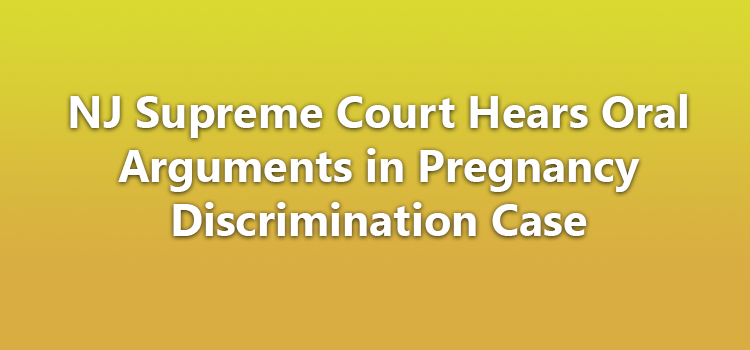
The New Jersey Supreme Court recently heard oral arguments in Delanoy v. Township of Ocean. The closely-watched case involves the New Jersey Pregnant Workers Fairness Act (PWFA), which amended the New Jersey Law Against Discrimination (LAD) to expressly prohibit pregnancy discrimination in the workplace. Among requirements, the PWFA obligates employers, subject to an undue hardship exception, to provide reasonable accommodations in the workplace to pregnant women upon their request, and to not penalize such women because of their pregnant status. The case represents the first opportunity for the state’s highest court to interpret the PWFA.
Facts of Delanoy v. Township of Ocean
Kathleen Delanoy brought a pregnancy discrimination suit under the PWFA against her employer, Ocean Township, and various Ocean Township officials. She alleged that the Township’s “Maternity Assignment Standard Operating Procedure” (Maternity SOP) violated the PWFA.
When Delanoy found out she was pregnant with her second child, she informed her supervisors her doctor recommended she be taken off patrol. She asked to be transferred to a “light-duty” or less strenuous position within the Ocean Township Police Department. The Maternity SOP and standard Light-Duty SOP policies require a police officer to deplete up to all of his or her accumulated paid leave time as a condition of receiving light-duty or a maternity assignment. However, the Light-Duty SOP, but not the Maternity SOP, grants the Chief of Police discretion to waive the requirement that an officer use up his or her accumulated time as a condition of the changed assignment.
In her suit, the Plaintiff alleged that the Department’s Maternity SOP discriminates against pregnant employees because it is less favorable than the light-duty assignment policy for nonpregnant officers. She further maintained that requiring her to deplete her accumulated leave time as a condition of her maternity assignment violates the PWFA, because employers are obligated under the statute to “reasonably” accommodate pregnant employees. She further argued that this condition improperly penalized her in violation of the statute.
The trial court granted summary judgment in favor of defendants, finding that defendants’ maternity assignment policy did not violate what it perceived as the PWFA’s “equal treatment” mandate. The court did not reach the issues of reasonable accommodation, undue hardship, or penalty. The court also denied plaintiff’s cross-motion for partial summary judgment on her facial challenge.
Appellate Division Decision inDelanoy v. Township of Ocean
The Appellate Division vacated the entry of summary judgment in favor of the defendants. It also upheld Delanoy’s facial challenge to the Township’s SOP policies and directed the trial court to grant her requests for declaratory and injunctive relief.
“We hold the Department’s maternity assignment policy, as written, unlawfully discriminates against pregnant employees as compared to nonpregnant employees who can seek and potentially obtain a waiver from the Police Chief. Such nonequal treatment violates the PWFA,” Judge Jack Sabatino wrote on behalf of the court. “Consequently, we uphold plaintiff’s facial challenge to those uneven policies and direct the trial court to grant her discrete requests for declaratory and injunctive relief, leaving other remedial issues to the trial court.”
The Appellate Division found that the trial court “underestimated” the significance of the key distinction between the two policies — that the Light-Duty SOP Policy allows the Police Chief for certain officers to waive the requirement that the officer receiving this benefit must deplete his or her accumulated bank of leave time. Judge Sabatino wrote:
In any event, the two written policies are clearly unequal on their face. No pregnant officers (no matter what positions they hold) can obtain a waiver, whereas some nonpregnant officers can, in the Police Chief’s discretion. The facial difference supports plaintiff’s requests for declaratory and injunctive relief.
The Appellate Division went on to find that it was “less clear” whether the facial difference between the two SOPs proximately caused Delanoy, who never had the chance to apply for a waiver, any damages. Accordingly, it directed that damages question be reserved for trial. The court similarly found that the Plaintiff’s allegations of retaliation and disparate treatment in the Defendants’ implementation of her modified assignment should be decided by a jury.
Issues Before New Jersey Supreme Court
The New Jersey Supreme Court agreed to consider the case. The specific issue before the court is: “Did the Township of Ocean Police Department’s ‘Maternity Assignment Standard Operating Procedure’ violate the New Jersey Pregnant Workers Fairness Act and its provisions within the New Jersey Law Against Discrimination, N.J.S.A. 10:5-12?”
The justices heard oral arguments on November 10, 2020. Much of the questioning involved whether wearing a gun is an essential function of the job of a police officer, as the Ocean Township Police Department maintains and Delanoy disputes.
Justice Barry Albin asked the township’s counsel: “So you are now saying that pregnant women who cannot wear their weapons cannot have any reasonable accommodation provided by your township? Is that your position?” He responded: “I know of no department that does not have a requirement to say, ‘don’t wear your weapon.’ Every police officer in every headquarters wears their weapon while they’re on duty unless in a cell block with prisoners.”
Delanoy’s attorney countered by stating. “If wearing a gun is an essential function of the job of a police officer such that no reasonable accommodation can be afforded, then women will not be police officers in the state of New Jersey if they want to have children,” he said, but “diversity in the ranks” is “exactly what this statute was designed to ensure.”
